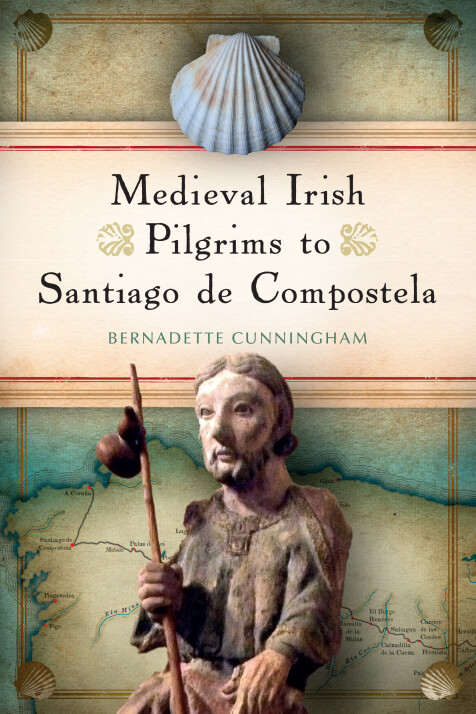Medieval Irish pilgrims to Santiago de Compostela
Bernadette Cunningham
“At a time when the ‘Camino de Santiago’ is attracting much attention for various reasons — the religious dimension, the heritage experience, walking holidays, general tourism — this work seeks answers to such questions as: who were the Irish who travelled to Santiago in medieval times?, what routes did they use? and why Santiago? [Bernadette Cunningham] tells us that writing this book has been a journey; to read the book is also a journey, a pleasant and intriguing adventure. Through documentary and archaeological evidence, the author laudably elucidates the phenomenon of medieval pilgrimage from Ireland to Santiago. her historical study is of great merit …. although we may read this book at home and not on pilgrimage to Santiago, Cunningham brings us ‘a step closer to paradise’.” Henar Velasco Lopez, Cambrian Medieval Celtic Studies, January 2022.
“[Bernadette Cunningham] provides fascinating insights into medieval Irish pilgrims to Santiago.” Heather Falvey, The Ricardian, Vol. XXXI, 2021.
"The book, because relatively inexpensive, will undoubtedly serve as an important point of reference for many years to come. It will be of interest to those studying the history of religion and devotional practice in medieval Ireland, but will also attract a readership interested in aristocratic culture in Gaelic and Anglo-Norman Ireland more generally." Simon Egan, Peritia Vol. 31, 2020.
'There is bound to be interest in Bernadette Cunningham's Medieval Irish pilgrims to Santiago de Compostela. Anyone who ventures to pick up this book will not be disappointed ... Cunningham looks at the people who went, their motives, the practicalities of the journey and how they changed over time', Archaeology Ireland (Spring 2019).
'Medieval Irish pilgrims to Santiago de Compostela by Bernadette Cunningham explores Irish links to Santiago and the lure of the journey, delving into ... such records as exist of several pilgrims from what the author terms 13th-century Anglo Ireland ... [It] is a scholarly work, replete with exhaustive footnotes and detailed explanatory references. It is also very readable and a rich contribution to the subject for anyone interested in the Camino who wants to dive deeper into its past', Peter Murtagh, Irish Times (July 2019)
' A new book explores the early development of this enduring Irish attachment to the Caminio ... and reveals that connection to go back much further than previously thought. The author ... provides a fascinating and very important platform for our understanding of this pilgrimage phenomenon and its "cult of St James" ... Essential reading for those wishing to understand and fully appreciate the Irish connection to Santiago de Compostela', Ireland's Genealogical Gazette (Jan 2019).
"Although Dr Cunningham's focus is on Ireland's historic links with Santiago, she sets the Irish experience within a broader European framework. She examines the involvement of both Gaelic and Anglo-Norman Ireland, aided by her unrivalled knowledge of Gaelic literature, artistic and archaeological sources, whole not neglecting the impact of changes in the construction of ships on the eve of the great discoveries, and trading connections between Ireland and Spain ... The result is not only a monument of scholarship, but a book that is eminently readable ... this splendid book will stand the text of time", Revd Dr Adrian Empey, SEARCH, vol.42.3 (Autumn, 2019).
"Bernadette Cunningham addresses the Irish devotion to the shrine of St James the Great at Compostela, and the trials and tribulations of such a journey in the Middle Ages ... It was not only Chaucer's pilgrims who sought - and hopefully found 0 knowledge, good company and salvation on the pilgrim trail, but the Irish who live on through this thought-ful [sic] book." Glyn Coppack, The Society for Medieval Archaeology, Vol 63.2 (December 2019).

